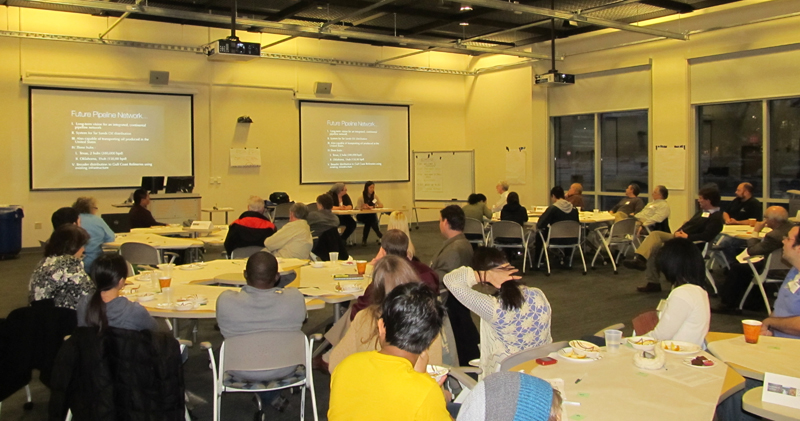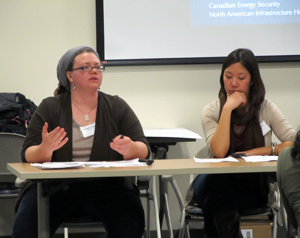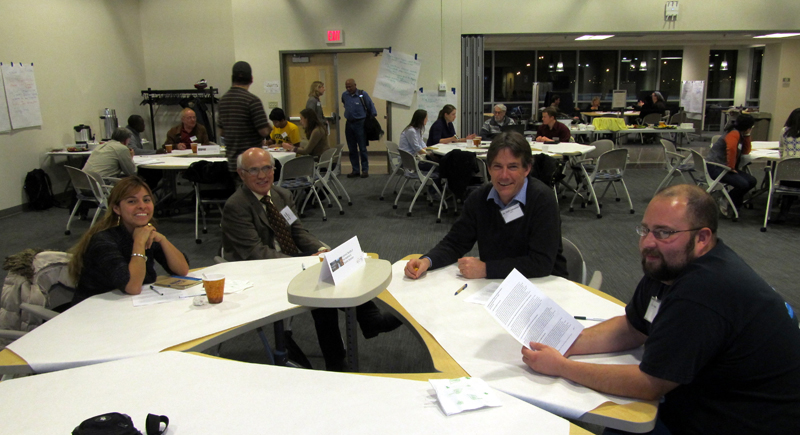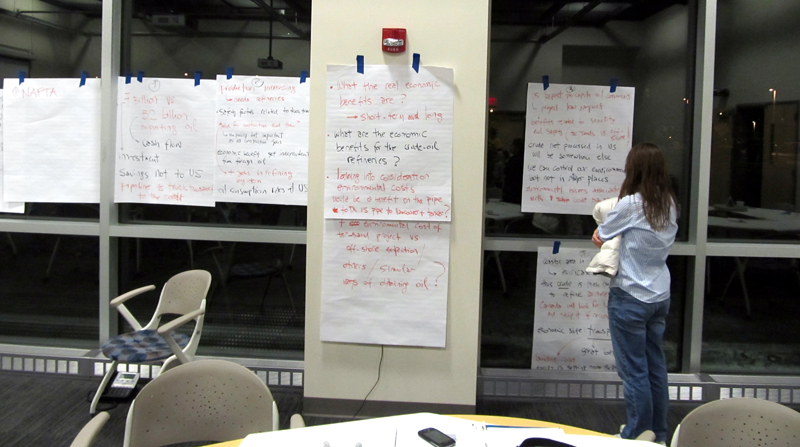2012 World Cafe Recap
The Ecological Sciences and Engineering (ESE) program's first ever Keystone event was a successful one, complete with active and engaged interdisciplinary discussion about the Keystone XL Pipeline proposal. More than 50 ESE faculty, graduate and undergraduate students, and invited guests participated in learning about and discussing this current and controversial topic.



After 45 minutes of discussion, each small group generated 3 unresolved questions about their specific discussion topic. These questions (listed below) were shared at the end of the evening with the large group and were posed to the panel speakers at the second Keystone Pipeline XL event.
Comments from participants:
"I liked the free flow of ideas and the open discussion allowing all opinions" - (Purdue Faculty)
"I really enjoyed attending Keystone Event 1. It was quite different than I had expected. Staying away from the advocacy element allowed a friendly interchange of ideas and perspectives." - (Purdue Faculty)
"I appreciated having it interactive.. It was easy to join conversations at the different tables and get to know new people" - (Purdue Student)

Questions generated in the Keystone XL Pipeline Series Event 1
1. Indigenous Perspectives
How many people of first nations are affected by tar sands development? Which individual nations? In what ways are they impacted?
How have indigenous knowledge systems been impacted by the disruption of species migration, such as the woodland caribou? Do the economic benefits of the pipeline project outweigh the losses to culture, nature, & traditional sources of subsistence?
How do Canadian First Nations and American Indians/ Alaska Natives engage their communities to resist development and raise awareness?
2. Environmental Impact: Climate Change and Greenhouse Gas Emissions
What is the best way to meet increasing energy demands? Is there any environmentally responsible way to develop a pipeline?
How do the environmental risks of the pipeline expansion compare with alternative routes (e.g. export and/or transport through British Columbia)?
TransCanada has indicated that they will consider sending tar sands crude oil and bitumen to Asia if the United States does not approve their proposal. Are we changing the scenario by not building the pipeline? Will the production rate from the tar sands be the same, less or greater with the pipeline?
3. Environmental Impact: Water Quality Protection and Pipeline Construction
What are the data gaps when it comes to determining the potential environmental impact of the pipeline, e.g., benefits or costs to wildlife, from byproducts of treatment and tailing pollutions, etc.?
What water are we concerned about when it comes to the pipeline project, e.g., drinking water, streams, ecosystems?
What steps are engineers taking to alleviate or eliminate spills and leaks from the pipeline and associated infrastructure?
4. Economic Benefits of the Keystone XL Pipeline Expansion
What are the real long- and short-term economic benefits of the pipeline?
What are the benefits of the pipeline for crude oil refineries in the southern United States?
How do the environmental costs of the Keystone project compare with off-shore extraction projects?
5. Energy, Environmental and Economic Security
How will the Keystone XL Pipeline impact U.S. energy security, as well as overall global energy security?
How will the Keystone XL Pipeline impact U.S. environmental and human health security, as well as overall global environmental and human health security, specifically in Canada?
What other feasible solutions are there for development of the tar sands oil?
6. What's driving the pipeline project?
What role does the North American Free Trade Agreement (NAFTA) have in determining the outcome of the Keystone XL pipeline proposal debate?
What other alternative energy options are available? Why approve a $7 billion pipeline as opposed to infrastructure that would support alternative energy sources?
Why is the pipeline needed to get tar sands crude oil and bitumen into the world market?
7. How Information is Represented (or Misrepresented) to the Public
How can we get objective information about the pipeline proposal?
How can information about the pipeline be presented credibly?
Does what the public sees, hears, wants when it comes to the pipeline really matter?

